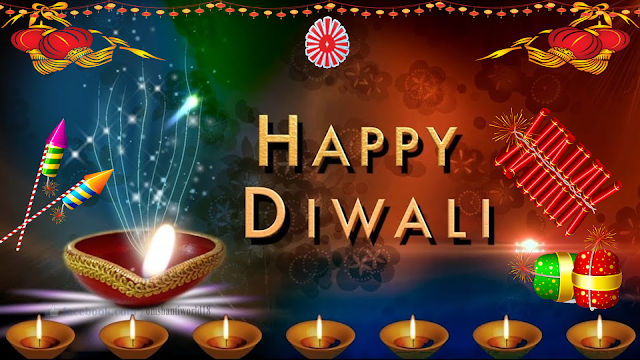
Diwali is a celebration of victory over evil and the coming of a New Year. But if we probe further, what is this darkness we want to remove? In reality, evil or darkness does not have an astitva or identity of their own – they exist due to a lack of goodness or light. Knowledge, power and all that is pure, are very real characteristics since they are part of us, perhaps dormant yet existing. The Festival of Lights, incidentally seen in every culture, is the fight against evil forces and the creation of peace and happiness. Diwali conjures up a number of things in the mind’s eye – sweets, new clothes, account books, Goddess Lakshmi, fireworks etc.
We begin with Dhanamyodashi, where families worship Dhanvantari, a special ayurvedic herb said to cure a person of all illnesses. As science too proves, about 98% of all diseases are psychosomatic, meaning the problem lies in the mind. With time and circumstances, human beings have lost a great degree of their inner power, thus making them vulnerable to attacks from the vices (lust, anger, greed, attachment, ego). The weak mind has affected the body too and when we take the medicine of spiritual knowledge, prescribed by the Ultimate Doctor God, we can cure both mind and body.
Our second day is celebrated as Narkchaturdashi. Spiritual Knowledge about Self-realization, God-realization etc. can only be taught by the Supreme. Diwali, the tradition of lighting diya's, actually describes how the Supreme Light comes to re-ignite our awareness of being points of energy or souls. This knowledge is used to overcome the foreign elements of vices. In memorial of these efforts, we have the story of Narkasur or destroying of evil.
The third day is spent in invoking Goddess Lakshmi. Today, we have unfortunately lowered the status of Lakshmi Devi to that of a banker. In reality, her name stems from the word, ‘Laksh’ meaning ‘ the goal’, implying that she stands for the ultimate goal of perfection that human beings can reach. The ‘wealth’ that she has to offer is knowledge and virtues; a divine character alone can attain prosperity (material and otherwise) and peace. Homes are cleaned thoroughly in her honor, but we forget that a clean mind and intellect are the easiest ways to attract her.
Moving to the fourth day of Balipratipada, we see success at every step or padh/kadam when we maintain a connection with the Supreme Soul. In spirituality, this is symbolic of yoga or union. When I visualize myself to be a point of light, and then direct my intellect and thoughts to the Supreme Parent, I experience God’s Shakti and love. This power helps me fight weaknesses and inculcate virtues.
The beautiful process of gaining knowledge, overcoming vices, cleaning the intellect, and remembering the Supreme, leads us to appreciate the fifth day, Bhaiyadooj or Bhaibeej. The knowledge of the ‘soul’ frees us from stereotypes and prejudices based on religion, caste, color, gender, and age. We then see every individual as being a child of God and so part of my spiritual family - the ultimate truth.
Sweets (maintaining loving relationships), new clothes (discarding everything old), new account books (settling karmic accounts), fireworks (burning evil off), and other, interesting rituals prepare us spiritually for the New Year or Age. The darkness of ignorance cannot remain; our deep desire to create a world of happiness will become a reality. The key lies in lighting a single ‘diya’ - my own spiritual awareness - and then "Jyot se Jyot Jagaate chaol, Prem ki Ganga Bahaate chaloo"…
THE REAL DIWALI
As per Godly Knowledge, the real Diwali will be the Golden Age or Satyuga. Everything will be pure in Satyuga. Here everybody will be abundant with all virtues, vice-less and non-violent.

